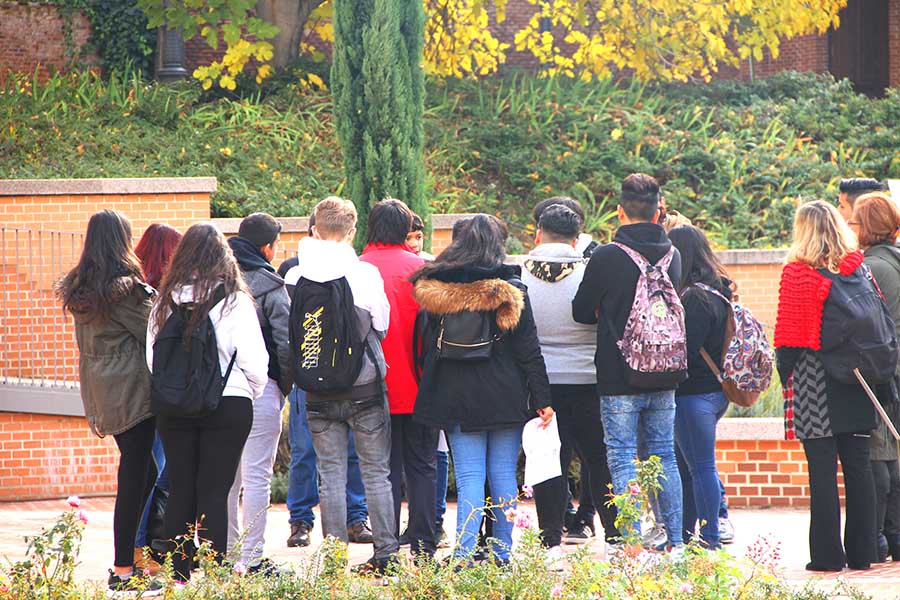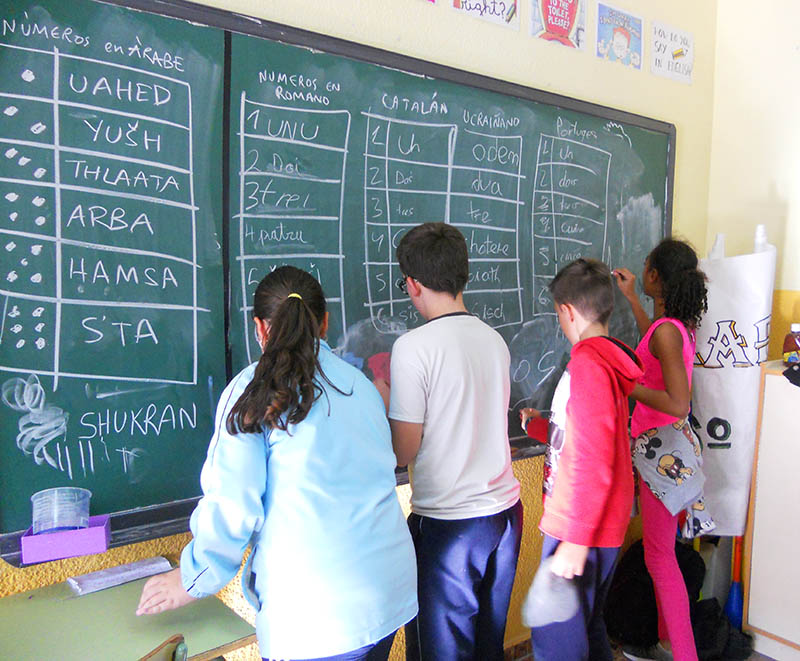Articles, Communications, Communications
عDHUC@ INTEGR@, a new project for diversity
Article author: Myriam de la Cavada - FUNCI
Date of publication of the article: 26/12/2018
Year of publication: 2018
Article theme: Human Rights, Human Rights, Inmigration, Inmigration, Islam, Islam, Islamophobia, Sustainability.
In 2018 we have given a giant leap in education for development with the project عDHUC@ INTEGR@, co-funded by La Caixa Social Work. The project focuses in the management of intercultural diversity, and the promotion of citizen participation, coexistence and institutional strengthening in Carabanchel, Arganzuela, and other endangered districts in the city of Madrid. It’s framed in the line of action of FUNCI EDUCA, in the strategic plan of FUNCI 2015-2019, which aims at promoting a critical global and proactive citizenship.
عDHUC@ INTEGR@: a different approach to manage diversity
عDHUC@ INTEGR@ has a symbolic character. It replaces the letter “e” of “educate” by the ع (ain), which means eye and fountain. This leads to عDHUC@ INTEGR@, meaning to educate in diversity by looking at the other. Likewise, in عDHUC@ INTEGR@, the DH are in capital letters, in reference to Human Rights. Finally, the arrow points out at the project’s virtual axis: the educational and raising awareness platform “differences add up”.
In addition to this, the project is complemented by actions in educational centers, with the purpose of promoting inclusion, and in actions of citizen participation whose goal is to promote social coexistence from a community approach. With regard to the actions carried out in schools, teachers are supported with techniques of diversity management, through innovative tools such as “From Maghreb to Mashreq, the Med-O-Med game”.
New tools: “From Maghreb to Mashreq, the Med-O-Med game”

In the frame of our cooperation platform Med-O-Med, for the sustainable development of the South of the Mediterranean and the Middle East, FUNCI has developed a game that presents the Mediterranean as a sea of different peoples, cultures and traditions, that shows the similarities and differences existing among the countries of the Northern and Southern shores. The game presents the richness and diversity of the region’s cultural and natural heritage, the importance of sustainability, the need for an optimum water management, and for natural resources in the face of environmental vulnerability, in the one of the region’s suffering the most from climate change. Thus, this educational tool:
- Promotes the students’ reflection on cultural diversity and the common elements that unite all peoples of the Mediterranean, through the cultural heritage of Al-Andalus.
- Introduces the phenomenon of immigration and refugees, and their current situation.
- Promotes the respect and dialogue as a means to promote coexistence, placing value on the culture of immigrants and their descendants.
The game has been designed and created in collaboration with Irenia, Jocs de Pau, a group of professionals that has received several recognition awards for the creation of educational tools, such as the Intercultural Innovation Award granted by the UN Alliance of Civilizations. The implementation of this education tools has been developed with much success in the schools of Carabanchel and Arganzuela.
Good practices in the social integration of immigrant women
In the frame of the Strategic Plan for Educational Development 2015-2019, during the year 2018, it is possible to highlight the research implemented by FUNCI in the technical assistance to the NGO Alliance for Solidarity (APS), in the frame of the project En Fem “S’engager à mieux integrer les femmes migrantes”.
In particular, it registered “good practices for the social integration of immigrant women, through culture and creativity, with the recommendation of local authorities on the cultural dimensions and integration of women from a local perspective”.
Among the outstanding practices, FUNCI selected four successful initiatives located in the districts of Arganzuela, Carabanchel and Ciudad Lineal, which can serve as a model for the European level. These are:
- The Employability Project UFIL Puerta Bonita, which does not only focus on the labour insertion of the youth at risk of social exclusion, but also promotes its inclusion and the personal fulfillment of their own-interests.
- The neighborhood association of Alto de San Isidro, created in 2008, has, on the one hand, promoted the leadership and self-management of training and leisure activities by Muslim women (some of which are part of the Board of Directors), while, on the other, promoting the coordination among key actors to foster coexistence in Carabanchel Alto.
- For ten years, the Active Domestic Service (SEDOAC) has protected domestic service by promoting actions for the full equality of social, labour, political, civil and economic rights among the citizenship and domestic workers.
- “Tayba” Association, composed by Spanish and foreign Muslims, mainly young, aims at promoting social inclusion without renouncing to their personal identities. Likewise, they have been promoting Muslim women leadership for the last ten years.
Raising-awareness activities, incidence and community participation

During 2018, many raising-awareness and participation activities have been carried out by relying on the common cultural heritage of Al-Andalus. Among them, the guided visits to the Park Mohamed I, carried out by the collaborators of our Center for the Study of Islamic Madrid (CEMI). Likewise, FUNCI, in collaboration with Parks and Gardens of Madrid’s City Council, and other key organizations from Arganzuela, Carabanchel, and the District Center, has developed different activities for the recovery of Al-Andalus’ historical heritage. This cultural actions have fostered social interaction, relational skills, and the knowledge of cultural minorities, by identifying common links and breaking prejudices and stereotypes. Among them, we can highlight:
- The exhibition “Gardens of Al-Andalus” at the Retiro, and the Islamic Library.
- The exhibition “Islam, a common heritage”, at the Center for Equal Opportunities María de Maeztu.
- The participation at the day of coexistence “Amor de Barrio”.
- Guided visits for Muslims at risk of social exclusion through Mayrit, Madrid’s historical center, in order to show the city’s Andalusi heritage and its link with the Islamic culture.
- The participation at the International Forum “II World Forum on Urban Violence and Education for Coexistence and Peace”, through a stand and the workshop “Salam, from Mayrit to the Mediterranean”.
Finally, in 2019, we will develop the new Strategy Plan of Education for the years 2020-2025, that will consolidate the actions launched during the period 2015-2019.


